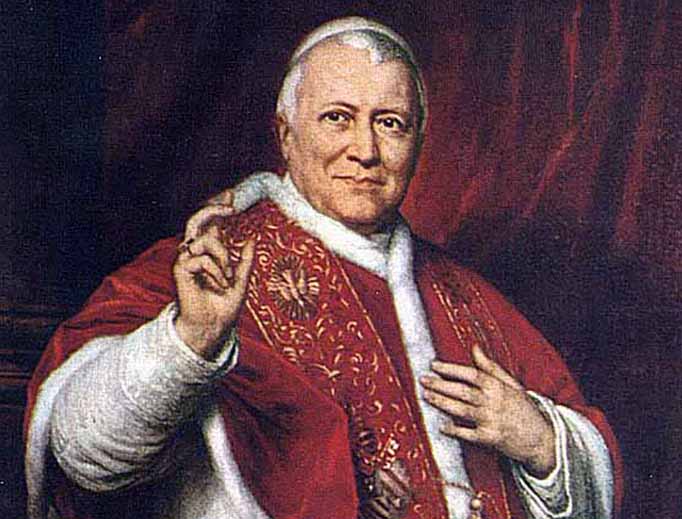Pope
Pope Pius IX
Illuminating life of Pope Pius IX as a writer and church reformer, a true beacon in sacred history.

Discover His Story
↓
Birthdate
13 May 1792 (85 years)
Birthplace
Senigallia, Marche, Papal States
Voting Status
Non-voting
Position
Pope
Titular Church
San Lorenzo in Damaso
Consistory
18 December 1873 by Pius IX
The Life of Pope Pius IX
Early Life and Calling
Pope Pius IX, born Giovanni Maria Mastai-Ferretti in 1792, grew up in a modest Italian family. From his youth, he felt a deep calling to serve God and the Church. He pursued studies in theology and canon law, inspiring many with his gentle and devout spirit.
1
Dogma of the Immaculate Conception
Pope Pius IX affirmed that the Blessed Virgin Mary was conceived without original sin. This deep declaration has brought much consolation and strength to the faithful by highlighting her unique purity and role as the Mother of Christ.
Path to the Papacy
Throughout his ecclesial career, he served in several important roles. His wisdom and kindness led him to be elected as pope in 1846. Even in times of change and political turmoil, he remained faithful to the teachings of the Church, determined to uphold its traditions with courage and love.
2
Papal Infallibility
During the First Vatican Council, Pope Pius IX defined the doctrine of papal infallibility. This important teaching means that when the pope speaks ex cathedra on faith and morals, his pronouncements guide the Church with divine truth.
Achievements and Challenges
- Defender of Faith: He worked hard to protect the Church’s doctrines.
- Promoter of Devotion: He encouraged prayer, education, and charity.
- Reformer: Although his era faced modern challenges, he stayed true to tradition.
3
Renewal and Expansion of Papal Authority
Pope Pius IX revitalized the role of the Papacy by working to strengthen the unity and spirituality of the Church. His efforts in diplomacy, social reforms, and the promotion of faith helped the Church to regain prominence and guide millions of souls in their walk with God.
Legacy
The life of Pope Pius IX reminds us of the power of devotion and perseverance. His journey from a humble beginning to the highest office in the Church continues to inspire many faithful believers around the world. His work serves as a lasting testament to the beauty and strength of the Catholic tradition.
LIGHT UP YOUR HOME IN FAITH
Enhance your prayer corner and living space with our Catholic candles—each one inspired by the saints and perfected for your devotional décor.
Pope Pius IX's Writings
Ineffabilis Deus
Ineffabilis Deus is one of Pope Pius IX's most influential writings. In this divine work, he defined the dogma of the Immaculate Conception, affirming that the Blessed Virgin Mary was conceived without original sin. Through this clear proclamation, the Church embraced a deeper understanding of Mary’s unique role in salvation history.
- Simplicity: Written in loving language, it embodies a simple yet profound statement of faith.
- Devotion: Encourages the faithful to honor Mary, whose purity points them toward closer union with Christ.
Quanta Cura
Quanta Cura is an encyclical that addresses the challenges of modern errors and modern philosophies that diverge from Holy Tradition. In this eloquent plea, Pope Pius IX warns against the spread of dangerous ideas that can undermine the moral and spiritual teachings of the Church.
- Warning: The encyclical carefully outlines the perils of embracing radical change without consideration of eternal truths.
- Guidance: It serves as a call to return to the foundations of faith, encouraging believers to uphold sacred traditions.
Syllabus Errorum
Syllabus Errorum is a companion document to Quanta Cura that provides a detailed list of condemned errors. This work outlines specific modern ideas and practices that are contrary to the teachings of the Church. Its clear and direct approach makes it invaluable for understanding the boundaries that preserve true faith.
- Clarity: Lists errors in a manner that is accessible to the faithful, guiding them away from dangerous influences.
- Relevance: Remains a profound resource for reflecting on how to align one’s life with the enduring truths of Catholic doctrine.
Pastor Aeternus
Pastor Aeternus is the solemn document of the First Vatican Council, promulgated under Pope Pius IX. This foundational work defines the doctrine of papal infallibility, stating that the pope, when speaking ex cathedra, is preserved from error in matters of faith and morals. Its theological depth resonates with those seeking certainty in the Church’s teaching authority.
- Authority: Affirms the pope's unique role as the shepherd of the Church, guiding it through divine inspiration.
- Continuity: Ensures that the eternal teaching of the Church remains unaltered, fostering unity among the faithful.
Sacred Reforms
Cardinal Spellman lauds Pope Pius IX for reforms that revitalized the Church's spiritual and administrative authority. He highlights reforms such as:
- Papal Infallibility: The reaffirmation of papal authority to guide the Church with divine wisdom.
- Doctrinal Clarifications: Definitions like that of the Immaculate Conception, uniting the faithful under clear dogma.
- Liturgical Renewal: Initiatives that enriched worship and reaffirmed the Church’s sacred traditions.
Cardinal Gregory’s Insight
Cardinal Wilton Gregory explains that Pope Pius IX’s legacy is defined by his courageous reaffirmation of Church doctrine and pastoral commitment. The pontiff’s firm defense against modern errors and his deep, traditional spirituality not only shaped the Church’s identity but also continue to inspire its faithful through a profound legacy of renewal and sanctity.
Critique of Authoritarian Centralization
Cardinal Newman criticized aspects of Pope Pius IX’s papacy that centered on the excessive centralization of ecclesiastical authority. He was particularly wary of the unilateral declaration of papal infallibility, arguing it undermined the organic, developmental nature of doctrine and diminished the role of local tradition and reason within the Church’s longstanding life.